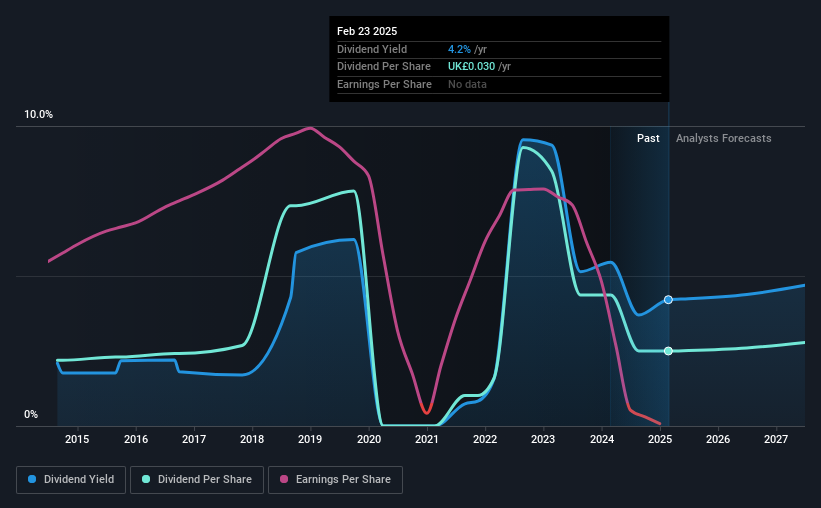
The board of Hays plc (LON:HAS) has announced that it will pay a dividend of £0.0095 per share on the 9th of April. This makes the dividend yield 4.2%, which will augment investor returns quite nicely.
Check out our latest analysis for Hays
Hays' Long-term Dividend Outlook appears Promising
We like to see robust dividend yields, but that doesn't matter if the payment isn't sustainable. Hays is not generating a profit, but its free cash flows easily cover the dividend, leaving plenty for reinvestment in the business. This gives us some comfort about the level of the dividend payments.
The next 12 months could see EPS growing very rapidly. Assuming the dividend continues along the path it has been on, the payout ratio could get to 80% which is certainly still sustainable.

Dividend Volatility
The company has a long dividend track record, but it doesn't look great with cuts in the past. The annual payment during the last 10 years was £0.0263 in 2015, and the most recent fiscal year payment was £0.03. This works out to be a compound annual growth rate (CAGR) of approximately 1.3% a year over that time. Modest growth in the dividend is good to see, but we think this is offset by historical cuts to the payments. It is hard to live on a dividend income if the company's earnings are not consistent.
Dividend Growth May Be Hard To Come By
Given that the dividend has been cut in the past, we need to check if earnings are growing and if that might lead to stronger dividends in the future. Over the past five years, it looks as though Hays' EPS has declined at around 9.4% a year. Declining earnings will inevitably lead to the company paying a lower dividend in line with lower profits. However, the next year is actually looking up, with earnings set to rise. We would just wait until it becomes a pattern before getting too excited.
Hays' Dividend Doesn't Look Sustainable
In summary, while it's good to see that the dividend hasn't been cut, we are a bit cautious about Hays' payments, as there could be some issues with sustaining them into the future. The payments haven't been particularly stable and we don't see huge growth potential, but with the dividend well covered by cash flows it could prove to be reliable over the short term. We don't think Hays is a great stock to add to your portfolio if income is your focus.
Companies possessing a stable dividend policy will likely enjoy greater investor interest than those suffering from a more inconsistent approach. Meanwhile, despite the importance of dividend payments, they are not the only factors our readers should know when assessing a company. Taking the debate a bit further, we've identified 1 warning sign for Hays that investors need to be conscious of moving forward. Is Hays not quite the opportunity you were looking for? Why not check out our selection of top dividend stocks.
Valuation is complex, but we're here to simplify it.
Discover if Hays might be undervalued or overvalued with our detailed analysis, featuring fair value estimates, potential risks, dividends, insider trades, and its financial condition.
Access Free AnalysisHave feedback on this article? Concerned about the content? Get in touch with us directly. Alternatively, email editorial-team (at) simplywallst.com.
This article by Simply Wall St is general in nature. We provide commentary based on historical data and analyst forecasts only using an unbiased methodology and our articles are not intended to be financial advice. It does not constitute a recommendation to buy or sell any stock, and does not take account of your objectives, or your financial situation. We aim to bring you long-term focused analysis driven by fundamental data. Note that our analysis may not factor in the latest price-sensitive company announcements or qualitative material. Simply Wall St has no position in any stocks mentioned.
About LSE:HAS
Hays
Engages in the provision of recruitment services in Australia, New Zealand, Germany, the United Kingdom, Ireland, and internationally.
Good value with adequate balance sheet.
Similar Companies
Market Insights
Community Narratives



